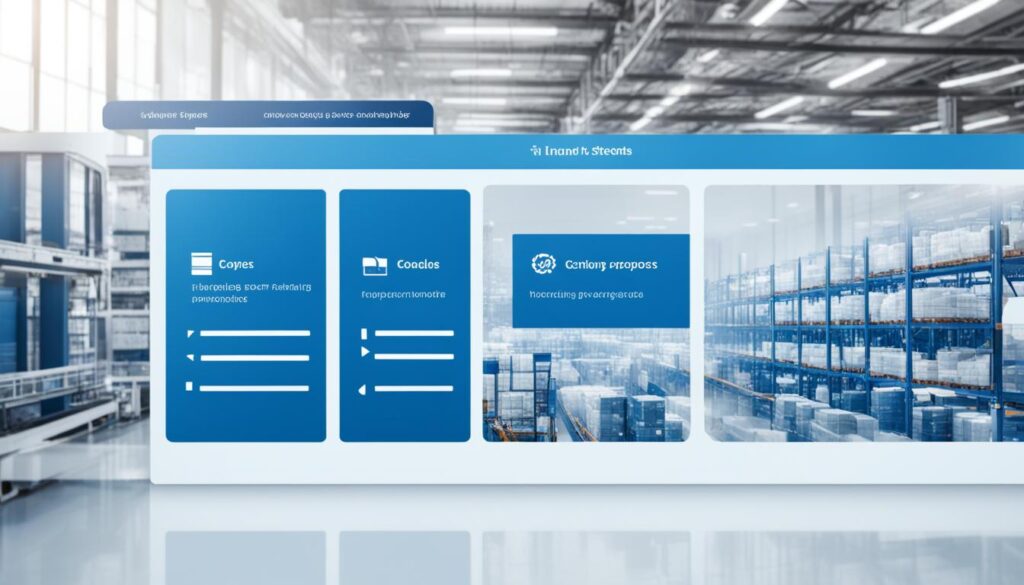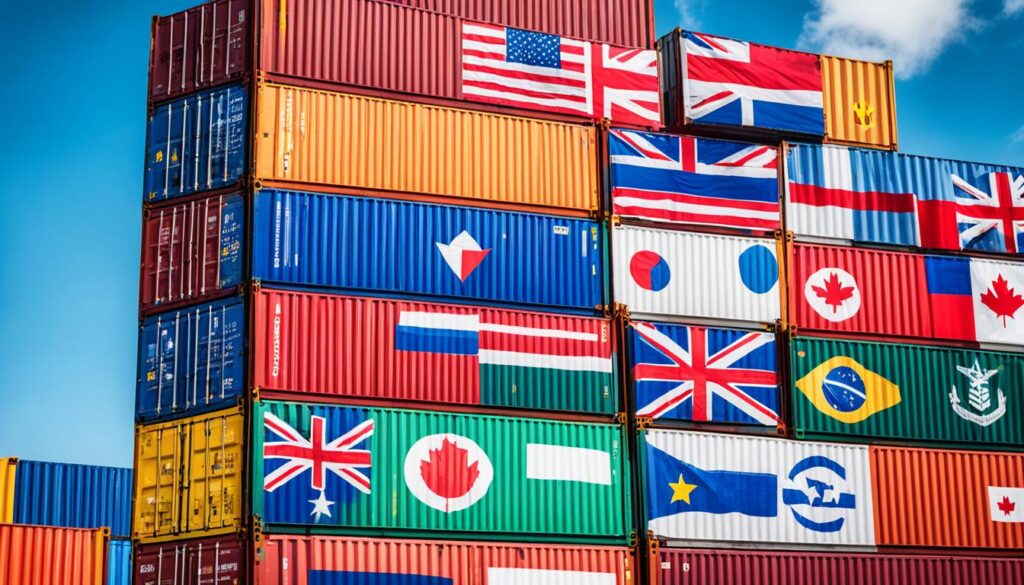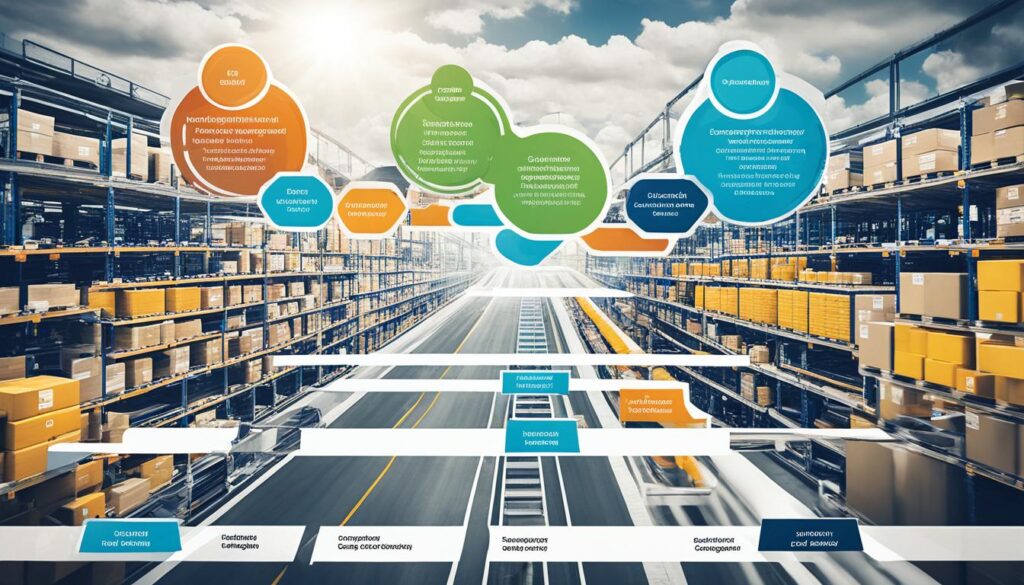Are you curious about how trade facilitation can transform the import-export process and improve customs clearance? What if I told you that it could reduce trade barriers, increase supply chain efficiency, and ensure compliance with trade regulations? In this article, we will explore the essential role trade facilitation plays in enhancing global commerce.
Key Takeaways
- Trade facilitation streamlines the import-export process and improves customs clearance.
- It aims to reduce trade barriers, increase supply chain efficiency, and ensure compliance with trade regulations.
- Trade facilitation is crucial for promoting international trade and enabling smoother cross-border transactions.
- By simplifying procedures and reducing paperwork, it saves time, costs, and promotes trade compliance.
- Trade facilitation measures benefit small and medium enterprises (SMEs), promoting their access to international markets.
The Importance of Trade Facilitation
Trade facilitation plays a vital role in promoting international trade, enabling smoother and more efficient cross-border transactions. It ensures compliance with trade regulations and enhances transparency in trade processes. By simplifying procedures and reducing unnecessary paperwork, trade facilitation helps businesses save time and costs while ensuring adherence to trade compliance requirements.
International trade facilitation encompasses various measures and initiatives aimed at streamlining trade processes and eliminating barriers. These include:
- Harmonizing trade regulations to promote consistency and clarity.
- Implementing electronic systems and digital technologies to facilitate trade documentation and information exchange.
- Enhancing customs procedures and reducing processing times for import and export activities.
- Promoting collaboration between customs authorities, businesses, and other stakeholders to improve trade facilitation practices.
By focusing on international trade facilitation, businesses can experience numerous benefits:
- Increased Efficiency: Streamlining trade processes and reducing red tape results in faster clearance times and improved supply chain efficiency.
- Cost Savings: Simplified procedures and reduced paperwork lead to cost savings for businesses involved in international trade.
- Compliance with Regulations: Trade facilitation ensures that businesses adhere to trade regulations, reducing the risk of penalties and delays.
- Enhanced Transparency: By implementing trade facilitation measures, businesses can benefit from enhanced transparency in trade processes, reducing the potential for corruption and fraudulent activities.
Overall, trade facilitation is a crucial element in enabling global commerce to thrive. It fosters international trade relations, promotes economic growth, and contributes to a more efficient and transparent trading environment.
Trade Facilitation Measures and Benefits
| Trade Facilitation Measures | Benefits |
|---|---|
| Harmonizing trade regulations | Consistency and clarity in trade procedures |
| Implementing electronic systems | Facilitated trade documentation and information exchange |
| Enhancing customs procedures | Reduced processing times for import and export activities |
| Promoting collaboration | Improved trade facilitation practices |
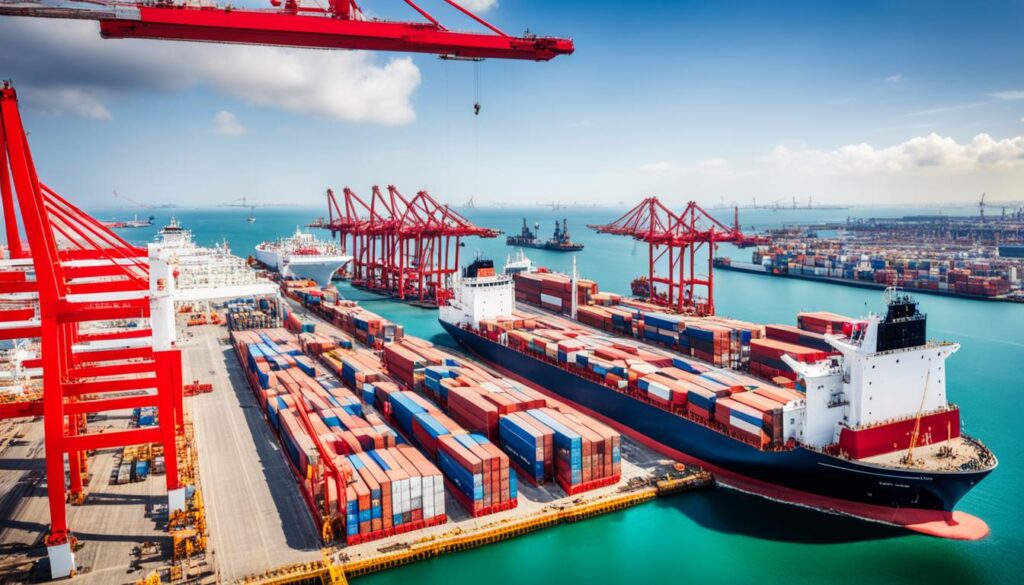
The Impact of Trade Facilitation on Business Success
Trade facilitation plays a pivotal role in improving supply chain efficiency, which is vital for the success of businesses involved in international trade. By streamlining the import-export process and reducing unnecessary delays, trade facilitation enables businesses to operate seamlessly and optimize their supply chain operations.
One of the key areas where trade facilitation makes a significant impact is in trade documentation requirements. Traditionally, completing trade documentation could be a time-consuming and complex task, often prone to errors. However, trade facilitation initiatives have simplified these requirements, making it easier for businesses to navigate the paperwork involved in international trade.
Furthermore, trade facilitation tools play a crucial role in enhancing the efficiency of trade transactions. Electronic data interchange (EDI) systems, for example, enable the seamless exchange of information between trading partners, eliminating manual processes and reducing the reliance on paperwork. Similarly, single window systems provide a centralized platform for businesses to submit and process trade-related documents, enabling faster and more accurate processing of trade transactions.
To illustrate the impact of trade facilitation on business success, consider the following table:
| Business Metrics | Without Trade Facilitation | With Trade Facilitation |
|---|---|---|
| Time spent on customs procedures | High, leading to delays | Reduced, enabling faster clearance |
| Trade documentation errors | Frequent, resulting in rejections | Minimized, ensuring compliance |
| Operational costs | Higher due to inefficiencies | Lower, resulting in cost savings |
| Competitiveness in global market | Limited due to trade barriers | Enhanced, enabling market expansion |
As shown in the table, trade facilitation significantly improves business metrics by reducing time spent on customs procedures, minimizing trade documentation errors, lowering operational costs, and enhancing competitiveness in the global market.
In conclusion, trade facilitation plays a critical role in ensuring the success of businesses engaged in international trade. By improving supply chain efficiency, simplifying trade documentation requirements, and leveraging trade facilitation tools, businesses can operate more efficiently, reduce costs, and expand their market reach.
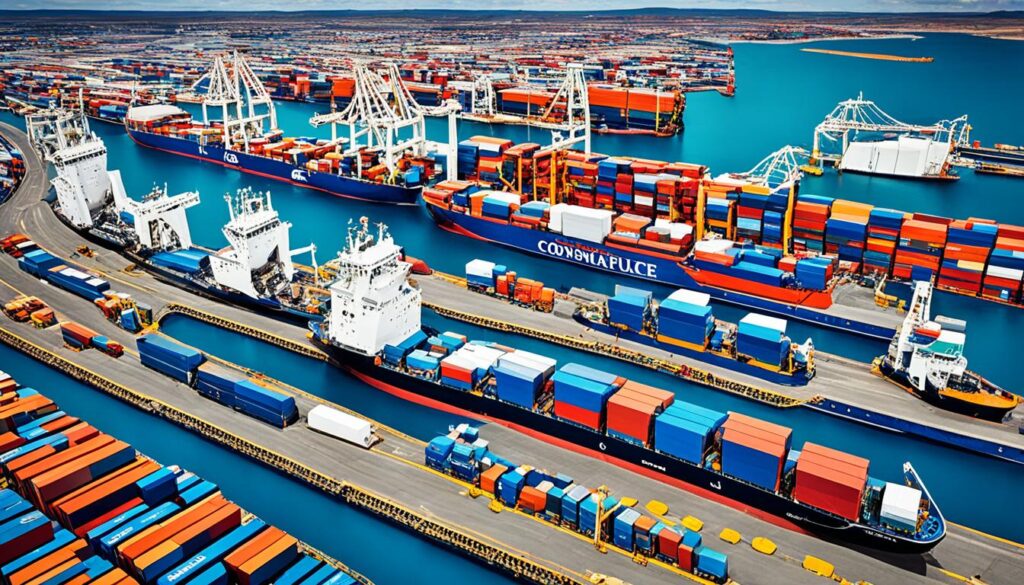
The Role of Trade Facilitation in Economic Development
Trade facilitation measures play a crucial role in promoting economic development. By implementing these measures, countries can attract foreign investment, boost exports, and create employment opportunities. Let’s explore how trade facilitation contributes to economic growth.
Attracting Foreign Investment
Trade facilitation measures improve a country’s attractiveness as an investment destination. When trade regulations are streamlined and customs processing times are reduced, businesses find it easier to operate and engage in cross-border trade. This attracts foreign investors who are looking for a favorable business environment. Increased foreign investment stimulates economic growth and creates new job opportunities.
Boosting Exports
Efficient trade facilitation enables businesses to expand their export capabilities. By harmonizing trade regulations and simplifying customs procedures, countries can remove barriers that hinder the export process. This allows exporters to save time and costs, making them more competitive in the global market. As exports increase, countries experience economic growth and a positive impact on their trade balance.
Creating Employment Opportunities
Trade facilitation measures promote economic development by generating employment opportunities. When businesses are able to engage in international trade more efficiently, they often need to expand their operations and hire additional workers to meet the growing demand. This leads to job creation and income generation, benefiting both individuals and the overall economy.
To further illustrate the impact of trade facilitation on economic development, let’s take a look at the following table:
| Trade Facilitation Measures | Impact on Economic Development |
|---|---|
| Harmonizing trade regulations | Promotes consistency and clarity in trade processes, attracting businesses and encouraging investment |
| Reducing customs processing times | Increases efficiency in import and export procedures, facilitating timely trade transactions |
| Implementing efficient trade facilitation tools | Enhances supply chain management and reduces trade costs, fostering economic growth |
By implementing trade facilitation measures such as harmonizing trade regulations, reducing customs processing times, and implementing efficient trade facilitation tools, countries can nurture a conducive environment for economic development. These measures attract foreign investment, boost exports, and create employment opportunities, driving sustainable growth.
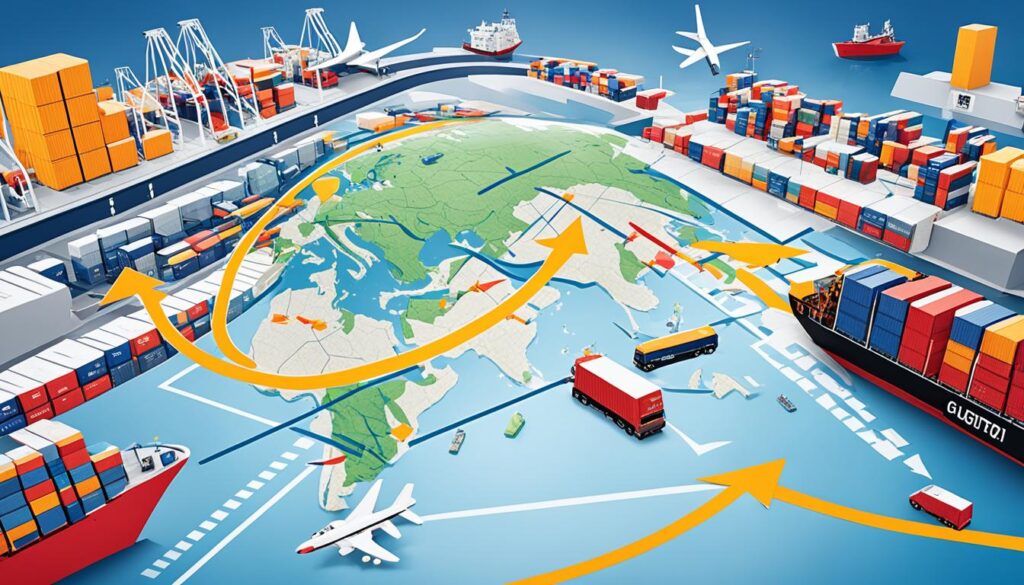
The Benefits of Trade Facilitation for Small and Medium Enterprises (SMEs)
Trade facilitation measures provide significant advantages for small and medium enterprises (SMEs), enabling them to thrive in the global marketplace. These measures streamline the import-export process, reduce trade barriers, and enhance customs procedures, allowing SMEs to expand their reach and compete effectively.
With trade facilitation, SMEs gain easier access to international markets, which opens up new opportunities for growth and expansion. By simplifying trade procedures and reducing administrative burdens, trade facilitation measures eliminate unnecessary complexities and paperwork, enabling SMEs to focus on core business activities.
Furthermore, trade facilitation reduces trade costs for SMEs, making international trade more affordable and accessible. By optimizing supply chain processes and eliminating bottlenecks, SMEs can achieve greater efficiency and cost savings in their import-export operations.
Listed below are the key benefits of trade facilitation for SMEs:
- Enhanced access to international markets
- Reduced trade barriers and obstacles
- Simplified import-export process
- Improved customs procedures
- Increased supply chain efficiency
- Reduction in trade costs
Trade facilitation measures empower SMEs to compete with larger enterprises on a level playing field. By leveraging these measures, SMEs can seize international trade opportunities, expand their customer base, and establish themselves as key players in the global market.
Trade Facilitation in Action: A Case Study
“The introduction of trade facilitation measures transformed our business. We were able to navigate complex trade regulations more efficiently and reach new markets with ease. The simplified import-export process enabled us to focus on our core competencies, driving growth and success.” – John Smith, CEO of XYZ Enterprises

| Benefits of Trade Facilitation for SMEs | Description |
|---|---|
| Enhanced access to international markets | Trade facilitation measures provide SMEs with opportunities to explore and enter new markets, increasing their potential customer base. |
| Reduced trade barriers and obstacles | Trade facilitation measures simplify trade procedures, reduce paperwork, and minimize bureaucratic hurdles, enabling SMEs to engage in cross-border trade more easily. |
| Simplified import-export process | Trade facilitation measures streamline import-export procedures, making it easier for SMEs to comply with customs requirements and complete necessary documentation. |
| Improved customs procedures | Efficient and transparent customs procedures reduce delays and costs for SMEs, ensuring faster clearance of goods and smoother trade transactions. |
| Increased supply chain efficiency | By optimizing supply chain processes, trade facilitation measures enhance overall efficiency, enabling SMEs to deliver goods to customers more effectively. |
| Reduction in trade costs | Trade facilitation measures help minimize trade-related costs, allowing SMEs to allocate resources more strategically and invest in their business growth. |
Global Efforts to Enhance Trade Facilitation
The World Trade Organization (WTO) is at the forefront of advancing international trade facilitation through its Trade Facilitation Agreement (TFA). This agreement aims to streamline and simplify trade processes, making international trade more efficient and accessible for businesses worldwide.
The TFA serves as a framework for effective cooperation between customs authorities, promoting transparency, predictability, and consistency in trade procedures. It establishes clear guidelines for implementing trade facilitation measures that enhance cross-border trade, reduce transaction costs, and foster economic growth.
One of the key aspects emphasized by the TFA is the integration of advanced technologies in trade facilitation. By leveraging digital solutions, such as electronic customs systems, automation, and data analytics, countries can improve their trade environment and enhance efficiency in import-export processes.
Adoption and implementation of trade facilitation measures are not limited to the TFA alone. Countries worldwide are recognizing the importance of creating favorable trade environments and attracting foreign investments through comprehensive trade facilitation strategies.
These measures encompass various aspects of trade, including:
- Simplifying customs procedures and documentation requirements
- Implementing risk management systems to expedite clearance processes
- Promoting the use of electronic data interchange (EDI) and single window systems for smoother trade transactions
- Enhancing collaboration between government agencies and stakeholders involved in international trade
- Investing in infrastructure development to support efficient trade flows
By focusing on trade facilitation, countries can foster a conducive international trade ecosystem that promotes economic growth, job creation, and increased market access for businesses.

Efforts to enhance trade facilitation are interconnected with the broader goal of promoting international trade as a driver of economic development. As countries prioritize the implementation of trade facilitation measures, they create a more inclusive and sustainable global trade system that benefits businesses of all sizes and contributes to overall prosperity.
The Impact of Trade Facilitation on Poverty Reduction
Trade facilitation measures play a crucial role in reducing poverty and promoting economic development. By enhancing access to international markets and reducing trade barriers, these measures empower developing countries to increase their exports and generate economic growth, ultimately leading to poverty reduction and improved living standards for the population.
One of the key ways in which trade facilitation contributes to poverty reduction is by creating job opportunities. As trade flows increase, industries expand and diversify, creating a demand for additional labor. This, in turn, leads to increased employment rates and income levels, lifting individuals and communities out of poverty.
Furthermore, trade facilitation measures help raise incomes by enabling businesses to engage in international trade more efficiently. By simplifying customs procedures, reducing trade costs, and enhancing supply chain efficiency, trade facilitation enables businesses to be more competitive in the global market. As a result, they can command higher prices for their products and services, thereby increasing their earnings and contributing to poverty reduction.
“Trade facilitation measures empower developing countries to increase their exports and generate economic growth, ultimately leading to poverty reduction and improved living standards.”
Economic development is another key outcome of trade facilitation. By streamlining trade processes and reducing bureaucratic hurdles, these measures attract foreign investment and stimulate domestic industries. This leads to increased production capacities, improved infrastructure, and the development of new sectors, all of which contribute to long-term economic growth.
Trade facilitation’s positive impact on poverty reduction and economic development can be further exemplified through real-world examples. For instance, countries like Vietnam and Bangladesh have experienced significant poverty reduction over the past decades, largely due to their efforts in enhancing trade facilitation. By implementing trade facilitation measures, these countries have expanded their export capabilities, diversified their economies, and raised incomes, resulting in improved living standards for their populations.
The Impact of Trade Facilitation on Poverty Reduction – Case Study
A recent case study from Rwanda demonstrates the transformative power of trade facilitation in reducing poverty. With the implementation of trade facilitation measures, such as simplifying customs procedures, automating trade documentation, and improving logistics infrastructure, Rwanda has witnessed a remarkable increase in its export volumes and diversification of its exports.
| Indicator | Rwanda (2010) | Rwanda (2020) |
|---|---|---|
| Population below national poverty line (%) | 39.1 | 29.7 |
| Exports of goods and services (% of GDP) | 17.6 | 32.6 |
| GDP per capita growth (annual %) | 2.7 | 7.7 |
The table above demonstrates the significant progress made by Rwanda in poverty reduction and economic development. Within a decade, Rwanda has reduced its poverty rate, increased its export volumes, and experienced substantial GDP per capita growth. These achievements can be attributed, in part, to the trade facilitation measures implemented by the country.
By leveraging the benefits of trade facilitation, countries can effectively contribute to poverty reduction and foster sustainable economic development. It is essential for governments, international organizations, and businesses to continue prioritizing and investing in trade facilitation initiatives to create a more inclusive and prosperous future for all.
The Role of Technology in Trade Facilitation
Technology plays a critical role in trade facilitation by enabling the adoption of digital technologies and trade facilitation tools. Advanced technologies such as data analytics, artificial intelligence, and automation revolutionize customs procedures and enhance risk management processes. By leveraging these technologies, countries and businesses can streamline trade processes, improve efficiency, and ensure compliance with trade regulations.
Digitization of Trade Documentation
One of the key benefits of technology in trade facilitation is the digitization of trade documentation. With the use of digital platforms and systems, the cumbersome and time-consuming process of dealing with physical documents is replaced by digital records. This not only reduces paperwork but also enables the seamless exchange of information between trading partners. By digitizing trade documents, such as invoices, bills of lading, and certificates of origin, customs procedures become more efficient and streamlined.
Automation of Customs Procedures
Through the adoption of automation, customs procedures are expedited and made more accurate. Advanced technologies automate various aspects of customs clearance, such as document verification, risk assessment, and cargo inspection. By reducing manual intervention, automation minimizes errors and biases, leading to improved trade facilitation and swift customs processing. Consequently, businesses can save time and costs associated with customs clearance, resulting in faster delivery of goods and enhanced customer satisfaction.
Enhanced Risk Management
Technology significantly improves risk management processes in trade facilitation. Through data analytics and artificial intelligence, customs authorities can analyze vast amounts of trade data to identify potential risks and anomalies. This enables proactive risk mitigation measures, such as targeting high-risk shipments for inspection. By focusing resources on high-risk activities, technology enhances the efficiency of risk management, safeguarding national security and facilitating legitimate trade.
“Technology plays a pivotal role in enhancing trade facilitation by revolutionizing customs procedures and facilitating seamless digital transactions. The adoption of digital technologies and trade facilitation tools is crucial for countries to stay competitive in the global marketplace.”
Overall, technology drives innovation and efficiency in trade facilitation, improving customs procedures and enabling seamless cross-border transactions. By embracing digital technologies and trade facilitation tools, countries can enhance their trade environment, attract more investments, and promote economic growth.
The Role of Technology in Trade Facilitation Table
| Technology | Benefits |
|---|---|
| Data Analytics | Allows for better risk assessment and informed decision-making. |
| Artificial Intelligence | Automates customs processes and improves accuracy. |
| Automation | Expedites customs clearance and reduces costs. |
Trade Facilitation and Sustainable Development
In today’s rapidly changing world, trade facilitation plays a vital role in promoting sustainable development. By implementing trade facilitation measures, we can pave the way for a sustainable future by promoting the transition to circular supply chains, reducing waste, and strengthening the resilience of economies.
One significant way in which trade facilitation contributes to sustainable development is through the promotion of circular supply chains. A circular supply chain focuses on minimizing resource consumption, maximizing the reuse and recycling of materials, and reducing the environmental impact of trade activities. By streamlining and optimizing supply chain processes, trade facilitation measures enable businesses to adopt more sustainable practices, resulting in reduced waste and increased resource efficiency.
Trade facilitation also plays a crucial role in reducing the environmental impact of trade activities. By improving the efficiency of customs procedures and documentation requirements, trade facilitation measures can help reduce the carbon footprint associated with international trade. For example, the adoption of digital technologies and electronic trade documentation can significantly reduce paper usage and transportation-related emissions.
Moreover, trade facilitation measures contribute to the resilience of economies in the face of climate change-related disruptions. By reducing trade costs and improving trade efficiency, countries can enhance their food security and strengthen their ability to cope with climate-related challenges. This increased resilience ensures that economies can continue to thrive, even in the face of potential supply chain disruptions caused by extreme weather events or other environmental factors.
Overall, trade facilitation serves as a catalyst for sustainable development by promoting circular supply chains, reducing the environmental impact of trade activities, and strengthening the resilience of economies. By embracing trade facilitation measures, we can move closer to a sustainable future, where economic growth, social well-being, and environmental stewardship go hand in hand.
Key Takeaways:
- Trade facilitation enables the transition to circular supply chains, minimizing resource consumption and reducing waste.
- Efficient customs procedures and digital documentation contribute to the reduction of the environmental impact of trade activities.
- Trade facilitation measures enhance economic resilience and strengthen food security in the face of climate change-related disruptions.
Case Study: Enhancing E-Trade for MSMEs in Cambodia
In Cambodia, a trade facilitation project was implemented to enhance e-commerce opportunities for MSMEs. This project aimed to modernize customs processes and establish an electronic advance data (EAD) system, with a focus on reducing clearance times for small package exports. Additionally, an e-logistics platform was developed to streamline shipment processes and provide MSMEs with easier access to postal and express shipment services.
The trade facilitation project in Cambodia recognized the growing importance of e-commerce in the global marketplace. By leveraging digital technologies and adopting innovative trade facilitation measures, MSMEs were empowered to expand their reach and compete in the e-commerce space. The project addressed key challenges faced by MSMEs, such as inefficient clearance procedures and limited access to reliable logistics services.
The establishment of an electronic advance data system allowed for the pre-arrival submission of trade-related information, enabling customs authorities to process and clear small package exports more efficiently. This not only reduced clearance times but also improved the predictability of the import-export process, providing MSMEs with greater certainty and control over their supply chains.
The development of an e-logistics platform further streamlined the shipment processes for MSMEs. It offered a centralized platform for managing shipments, facilitating end-to-end tracking, and providing real-time visibility into the movement of goods. Through this platform, MSMEs gained access to a wide range of postal and express shipment services, enabling them to meet customer demands and deliver products in a timely manner.
Benefits of the Trade Facilitation Project:
- Reduced clearance times for small package exports
- Improved predictability and control over supply chains
- Easier access to postal and express shipment services
- Increase in e-commerce opportunities for MSMEs
- Enhanced competitiveness in the global marketplace
This case study showcases how trade facilitation projects can effectively support e-commerce growth and empower MSMEs in developing countries. By leveraging digital technologies and implementing tailored trade facilitation measures, countries can create an enabling environment for MSMEs to thrive in the e-commerce sector.
Trade facilitation projects like the one in Cambodia demonstrate the transformative impact of trade facilitation in enhancing the competitiveness and resilience of MSMEs. They contribute to economic growth, job creation, and inclusive trade, ultimately fostering sustainable development.
| E-Trade Enhancements | Impact |
|---|---|
| Modernization of customs processes | Reduction in clearance times for small package exports |
| Establishment of electronic advance data system | Improved predictability and control over supply chains |
| Development of e-logistics platform | Easier access to postal and express shipment services |
Trade Facilitation for Inclusive Growth
Trade facilitation plays a crucial role in driving inclusive economic growth by empowering MSMEs to participate in international trade. By reducing trade barriers and simplifying customs procedures, trade facilitation enables MSMEs, including women-owned or led businesses, to engage in cross-border commerce and expand their market reach. This leads to job creation, increased incomes, and overall socioeconomic development.
MSMEs are the backbone of many economies, accounting for a significant portion of employment and GDP. However, they often face challenges when it comes to international trade, such as complex customs processes, high tariffs, and limited access to global markets. Trade facilitation measures address these barriers and create a more favorable environment for MSMEs to thrive.
By streamlining customs procedures, trade facilitation reduces the time and costs associated with cross-border transactions. This allows MSMEs to efficiently import raw materials and export finished products, enhancing their competitiveness in the global marketplace. Moreover, trade facilitation measures promote transparency and predictability in trade processes, enabling MSMEs to plan and execute their international trade operations more effectively.
Women-owned or led businesses, in particular, can benefit from trade facilitation efforts. By addressing the gender-specific challenges they face, such as limited access to finance and networks, trade facilitation helps to level the playing field and create equal opportunities for women entrepreneurs. This not only fosters gender equality but also contributes to overall economic growth and poverty reduction.
Furthermore, trade facilitation plays a vital role in promoting inclusive economic growth by fostering regional integration and cooperation. By harmonizing trade regulations and implementing trade facilitation measures, countries can enhance connectivity and collaboration, leading to increased trade flows and shared prosperity.
In conclusion, trade facilitation measures are essential for fostering inclusive economic growth and empowering MSMEs. By reducing trade barriers, simplifying customs procedures, and addressing gender-specific challenges, trade facilitation enables MSMEs to participate more effectively in international trade. This leads to job creation, increased incomes, and overall socioeconomic development, contributing to a more inclusive and prosperous future.
Next Steps for Trade Facilitation
Moving forward, it is crucial for the global community to continue its efforts in enhancing trade facilitation to foster efficient and inclusive global trade. To achieve this, capacity building initiatives should be prioritized to support countries in implementing trade facilitation measures and equipping them with the necessary skills and knowledge.
Capacity building plays a significant role in promoting global trade by empowering countries to effectively streamline trade processes, reduce trade barriers, and enhance supply chain efficiency. By investing in education and training programs, governments can ensure that their officials are equipped with the expertise to implement trade facilitation measures effectively.
Furthermore, the adoption of advanced trade facilitation tools is essential in optimizing trade processes and maximizing the benefits of global trade. Technologies such as electronic data interchange (EDI), single window systems, and digital platforms enable seamless information exchange, simplify trade documentation requirements, and expedite customs clearance procedures.
To achieve lasting impact, collaboration among governments, international organizations, and businesses is vital. By working together, we can share best practices, promote knowledge exchange, and develop innovative solutions to address the challenges in global trade facilitation. This collaborative effort will ensure the continuous improvement and optimization of trade facilitation practices, leading to enhanced global trade and economic growth for all stakeholders involved.

